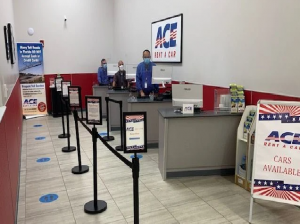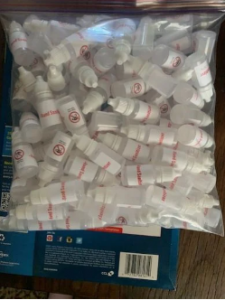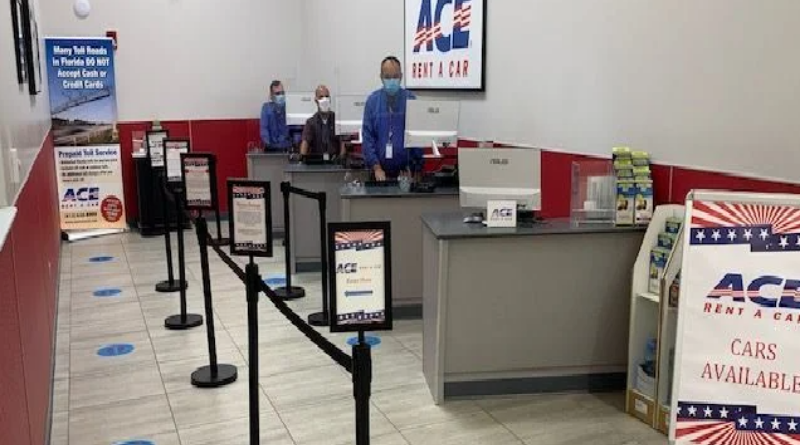Small Car Rental Companies Pivot to New Business
“The coronavirus crisis could not have come at a worse time,” wrote Rich Guernsey, owner of Rabbit Rentals, on May 21. “We took delivery of the fourth of six new vans we had on order from Ford on March 9. Less than a week later, everything fell apart.”
For many small car rental operators in the U.S., Christmas comes in the summer. For Guernsey, his small passenger van rental company serving northern and central Utah does 70% of its business from April to September.
Yet for two months after the crisis started, he had only two rentals. And they were freebies, donated for humanitarian purposes. “We are hoping things will open up soon or else we’ll be sunk for the season,” he wrote.
Indeed, Auto Rental News survey data suggests 12% to 15% of U.S. independent and franchised car rental operators have shut down, perhaps temporarily, possibly for good.
On top of it all, Guernsey applied for the Paycheck Protection Program (PPP) but was turned down because his employees are family members, also owners of the business.
But Guernsey, determined he wouldn’t go down without a fight, went about making changes.
Low-Tech, No Contact
Along with “drastic” rate reductions, he adopted WYSIWYG (what-you-see-is-what-you-get) pricing, a simplified structure with taxes included and no hidden fees. All rentals now come with unlimited miles.
He changed the Rabbit Rentals marketing slogan from “We rent vans, big vans, beautiful vans, nearly new vans, only vans” to “We guarantee the best vans and the best prices in the state.”
From two rental locations, he expanded to 10 drop-off spots at commuter train stations. This allows the staffer to drop the van and hop on the commuter train to get back to the main office.
The new drop spots come with a low-tech contactless rental process. Before the start of each rental, Guernsey emails the renter a copy of the rental agreement. The renter then gets a text with the exact location of the van and an access code to punch into a keypad (installed for $150) on the driver’s door.
Still, he wasn’t sure if the customer service and process improvements would be enough. “I have my doubts about surviving this crisis,” he wrote then.
Paperless Option
“Not long ago, I was happy to see 10% utilization,” wrote Helder Dias, an ACE affiliate serving South Florida, on May 21. “Within the next few days, we’ll be over 40%!” When any car rental operator gets excited about 40% utilization, you know it’s trying times.
Dias implemented his own version of a contactless delivery solution. He delivers vehicles using a pickup truck and a small car trailer, which avoids the time and expense of having two employees make the trip.
His car rental management system, TSD, has new functionality that allows the rental agreement to be signed on customers’ cell phones or connected devices. “I am going to continue using this going forward, it gives it a paperless option,” he says.

Creative Procurement
Lisa Cisler, an ACE Rent A Car affiliate serving Tampa, Fla., adjusted her policy to allow out-of-state rentals for Memorial Day. But she remains wary of contactless rentals and the potential for fraud.
“We have had to adjust for sure,” wrote Cisler on May 20, when her utilization had increased to a mere 25%. She was expecting 65% utilization for Memorial Day — far from the normal holiday traffic but a glimmer of hope.
Foregoing a contactless solution, Cisler is adamant about cleanliness. She relentlessly pursued hand sanitizer with 7 am runs to CVS and Walgreens, as well as a medical supply store, an auto supply store, and a local rum company that converted to sanitizer production.
Some of that sanitizer is added to small labeled bottles for giveaways to rental customers.
She’s also procured caseloads of Clorox wipes and Lysol and shared these resources with another car rental company occupying the same garage, which for weeks wasn’t getting any supplies from its corporate office.
Max Sanitization
“Well, when you make most of your money from film and television production, and that’s shut down, you can imagine what it’s doing to our business,” said Eric Humphreys, marketing director for Avon Car Truck and Van in Los Angeles.
Nonetheless, Avon is seeing some rentals from local delivery and moving businesses and has moved to an electronic rental transaction.
Avon has also taken cleaning and disinfecting to new heights: The company researched and procured an EPA-approved dissolved chlorine dioxide gas that is proven effective to eradicate SARS-CoV-2 almost immediately. An employee in full PPE uses a fog machine to spray into vehicle cabs and truck box interiors.
Airport Switch
For Phil Spink, operations manager for the Sixt Indianapolis franchise, local rentals are especially tricky when you’re operating inside the rental facility of a major airport.
The airport gives renters 29 minutes free parking in the garage, then charges airport parking rates by the hour. “If we can get the customer out in less than 30 minutes it works out well,” Spink wrote.
On May 21 at the Indiana International Airport, Sixt reported utilization of 33%, with low daily rates for local renters looking to rent for extended periods. This was an improvement over an abysmal April, in which volume plummeted 94% compared to April 2019.
With the new increased demand for consumer goods deliveries, Spink had reached out to local food banks, municipalities, grocery stores, and restaurants to gauge a need for additional fleet. “We have had some positive conversations; however, it has not materialized in an increase in business,” he says.
Sixt Indy has started delivering rental cars within a 10-mile radius. The operation has adjusted some policies and practices with an increase in local customers renting instead of flying. It’s removed geographical restrictions and waived additional driver’s fees for family members traveling together.
While debit cards had been accepted with confirmation of a return flight, the airport branch now accepts debit cards from customers with a hotel confirmation.
Stay the Course
Sean Cox, a U-Save Car and Truck Rental franchisee, is wary of relaxing the rules too much and giving cars away. “If I’m battling for every customer, I’m probably going to start seeing my loss rates increase; either through damaged cars or non-paying customers,” he wrote.
Cox, who had to shutter his Colorado Springs, Colo. operation to focus on his Charlotte, N.C. store, started seeing the pandemic warning signs in late February. March was decimated, while April showed a “push on the books.” Memorial Day was shaping up for 75% to 80% utilization, but with off-season rates.
Cox figures 80% of accommodations such as extra free miles, adjusted rates for longer periods, upgrading for pennies, and modified deposit requirements result in some form of unexpected loss.
“Stick to what you know,” Cox counseled. “Don’t start trying to change your model because you’re starting to feel pressure to perform or make tires roll. There truly is safety in what you know best.”
Wrote Guernsey, who implemented the text-access code system: “We have not had an issue with theft or fraud in the three years we have been in business (knock on wood).”
PPP Catch-22
Tom Mellett, a U-Save operator in Glenside, Penn., hasn’t loosened his qualifications for renting.

Though business down, “I would rather let a vehicle sit than roll the dice on a risky rental,” he wrote. “It takes a lot of good business to make up for a bad rental and there just isn’t enough good business out there right now.”
Like Guernsey, Mellett specializes in van rentals and this summer is shaping up to be a lean Christmas. He was able to cancel a third of his summer inventory, procured through a Ford repurchase program. The second third had been turned in for sale with only about 2,000 miles each.
“We hope that renters will be willing to rent the remaining third this summer,” he wrote. “Right now, no one is interested in climbing into a van with 14 other people.”
Unlike Guernsey, Mellett was able to take advantage of PPP. However, the program initially required spending 75% of those funds on payroll in an eight-week period during the partial shutdown. This made it a lot harder to coax employees back to work when the federal government has supplemented unemployment with an extra $600 per week, he wrote.
Three Weeks Later
The world was changing fast before the pandemic — and it’s changing a lot faster now. A check-in with the same operators just three weeks after initial contact reveals measured optimism, and thoughts about the future.
Cisler is already ahead of last year’s June with 80% utilization. “We would have more on rent, but 15-passenger vans aren’t renting at all,” she wrote.
Many of her units are out of service due to manufacturers’ recalls. Getting them back into service has been a challenge. “Our vendors are behind in getting to us because they laid off people, and now we are all busy.”
In many leisure-heavy markets, fleet contraction because of the bankruptcy of Advantage/E-Z has buoyed competitors, including Cisler.
Mellett has noticed very little lead time for reservations. “People seem hesitant to plan,” he wrote. Echoing Cisler, full-size passenger van reservations are still almost nonexistent. Yet minivans and SUVs are seeing better volumes, and the car segment “has been very busy.”
As of June 12, Dias said his Miami store is running over 60% utilization while Fort Lauderdale is at 50%.
At Sixt Indy, Spink reported that while May was projected to be down 66% compared to May 2019, June was expected to be down “only” 40%.
Cox is seeing higher utilization with cheaper vehicles than the expensive ones. He echoed a common refrain: “This month we’ll make some money, but purely because we’ve really trimmed back our expenses.”
For Cox, the pandemic has enabled some big thinking: “We will definitely be shifting our model from trying to compete head-to-head with the majors, both locally and in airport markets, to a model we successfully utilized in the mid 90’s — cheap, reliable cars,” he wrote.
In Los Angeles, film and television studios have the green light to resume filming. For Avon, the ramp up can’t come fast enough.
At Rabbit Rentals, Guernsey is looking forward to the eminent reopening of the national parks and Disneyland, albeit with limited capacities.
“Yes, business has picked up,” he wrote. “I am beginning to be a bit optimistic that we will survive this.”
FONTE: AUTO RENTAL NEWS

